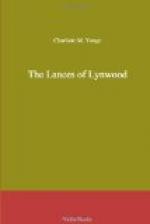The open space beyond the walls of Bordeaux presented a bright and lively scene. It was here that the pages of the Black Prince were wont to exercise those sports and pastimes for which the court of the palace scarce offered sufficient space, or which were too noisy for the neighbourhood of the ladies, and of the invalid Prince.
Of noble and often of princely birth were all who entered that school of chivalry, and, for the most part, the fine open countenances, noble bearing, and well-made figures of the boys, testified their high descent, as completely as the armorial bearings embroidered on the back and front of their short kirtles. Many different provinces had sent their noblest to be there trained in the service of the bravest Knights and Princes. There, besides the brown-haired, fair-skinned English boy, was the quick fiery Welsh child, who owned an especial allegiance to the Prince; the broad blue-eyed Fleming, whose parents rejoiced in the fame of the son of Philippa of Hainault; the pert, lively Gascon, and the swarthy Navarrese mountaineer—all brought together in close and ever-changing contrast of countenance, habits, and character.
Of all the merry groups scattered through that wide green space, the most interesting was one formed by three boys, who stood beneath a tree, a little from the rest. The two eldest might be from ten to eleven years old, the third two or three years younger, and his delicate features, fair pale complexion, and slender limbs, made him appear too weak and childish for such active sports as the rest were engaged in, but that the lordly glance of his clear blue eye, his firm tread, and the noble carriage of his shapely head, had in them something of command, which attracted notice even before the exceeding beauty of his perfectly moulded face, and long waving curls of golden hair.
So like him, that they might have passed for brothers, was one of the elder boys, who stood near—there was the same high white brow, proud lip, regular features, and bright eye; but the complexion, though naturally fair, was tanned to a healthy brown where exposed to the sun; the frame was far stronger and more robust; and the glance of the eye had more in it of pride and impatience, than of calm command so remarkable in the little one. The three boys were standing in consultation over an arrow which they had just discovered, stuck deep in the ground.
“’Tis my arrow, that I shot over the mark on Monday,” said the elder.
“Nay, Harry,” said the younger boy, “that cannot be; for remember Thomas Holland said your arrow would frighten the good nuns of St. Ursula in their garden.”
“It must be mine,” persisted Harry—“for none of you all can shoot as far.”
“Yes, English Arthur can,” said the little boy. “He shot a whole cloth-yard beyond you the day—”
“Well, never mind, Edward,” said Harry, sharply—“who cares for arrows?—weapons for clowns, and not for Princes!”




